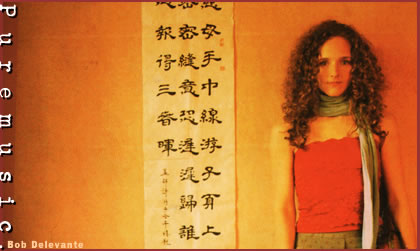
A Conversation with Abigail Washburn (continued)
PM: How fluent a Mandarin speaker are you? One is led to believe that you're pretty dang fluent.
AW: As far as Americans speaking Chinese, I'm pretty good. There was a time when I would have said, "I'm fluent." But that was a couple years back before I decided to stay in Nashville and study banjo.
[laughter]
AW: I would say that I'm conversationally fluent. There's a lot I can talk about with a person. When I start getting into interview situations with Chinese audiences and Chinese media, I think I'm going to struggle, especially in the beginning, because there's a lot that I want to say that is deeply felt. And it's a little bit harder topic for me to express very well in another language. Plus sometimes these things come to my head, like I want to talk intellectually about the tradition, or whatnot, and there's a lot of missing vocabulary.
PM: You run out of words.
AW: I do. So that part is going to be a real challenge. But I've got sort of a long-term vision of all this, that in the next few years the competency in all areas will sort of rise to the same level. And my hope is that I'll be very fluent and playing a lot of music in China and working with Chinese people and interacting with the media all the time. That would be my hope.
PM: As I mentioned to you yesterday, my brother is connected to a TV station in China. And when I was talking to his producer about you today, he was saying, "Well, let's try to do something different with Abby when we hopefully run into her in December. Maybe we could, aside from just doing a celebrity interview kind of a thing, or shoot part of a show, maybe we could get some footage of her talking to Chinese kids about music, and make a whole program out of it."
AW: I think it would be a lot easier speaking really comfortably in Chinese with a group of kids, talking about the music, or with a group of college students, or whatever, which is what I did a lot of. I did a lot of MC-ing, and hanging out with Chinese college students on my last trip. That was a comfortable environment for me. I think having really sort of quick, savvy answers to questions asked by an interviewer is going to be a different skill. But I'll give it my best.
PM: Yeah. And you'd like this producer. He's in his twenties, too, from L.A.
AW: Cool. Is he a Chinese speaker?
PM: He is to some degree, but none of the crowd that's there or myself when I was there really had the opportunity to get into an intensive language situation. People had some tutors and such, but it was much slower going than an intensive language course would have been.
AW: Yeah.
PM: I think they've done some since then, but yeah, they're still very elementary Chinese speakers. And I can't believe that I missed you when you were over there playing the Cotton Club around the corner from my house. When was that?
AW: Well, that was last November. It was November 10th, I remember, because it was my birthday.
PM: Last November. Yeah, I was certainly there, then.
AW: Oh.
PM: That's a shame. Because I was playing at the House of Jazz and Blues over on Maominglu. Did you check that joint out at all?
AW: Oh, no, I didn't.
PM: It's a wonderful joint. It's kind of like a Midtown jazz club in New York.
AW: Cool.
PM: You ought to gig there when you go back. I'll try to put you together with the lady who books the club.
AW: That'd be great.
PM: She's bilingual, also lived in New York. I lived in back of the Xianyang Market--you know the Starbucks there on Nanchanglu?
AW: Oh, yeah, I know that.
PM: And I lived in the building behind that, walking distance from the Cotton Club
AW: Isn't that crazy.
[laughter]
PM: How did your bandmates like touring in China? continue
print (pdf) listen to clips puremusic home